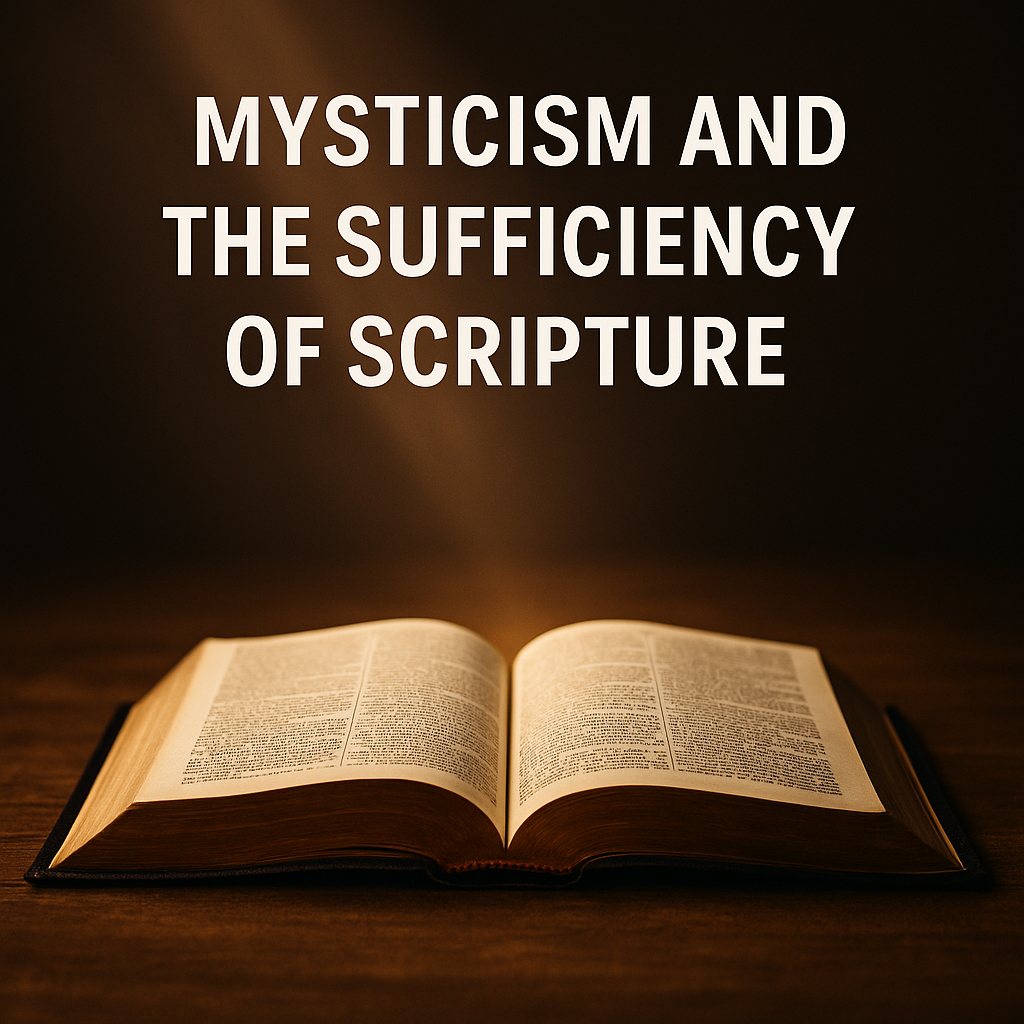⏱️ Estimated Reading Time: 3 min read
Mysticism and the Sufficiency of Scripture
Contending for the Word · · Written by Dave Jenkins
Defining Mysticism
Mysticism is the pursuit of direct, experiential union with God apart from His revealed Word. Throughout history, mystical practices have appeared both in pagan religions and within parts of the church. Whether through contemplative prayer, inner “listening,” or seeking visions and ecstatic experiences, mysticism emphasizes personal feelings of closeness to God over the objective truth of Scripture.
At first glance, mysticism may seem spiritual, since it uses religious language and appeals to the desire for intimacy with God. In practice, it shifts authority from God’s Word to subjective experience. That leads us to ask an important question, What is mysticism and why is it unbiblical?
Marks of Mysticism
- Inner revelations, elevating personal impressions or “whispers from God” above Scripture.
- Contemplative techniques, using mantras, breath prayers, or altered states of consciousness to “experience” God.
- Devaluing doctrine, treating biblical truth as cold or secondary compared to feelings.
- Syncretism, blending Christian language with practices drawn from paganism, New Age spirituality, or Eastern religions.
- Focus on self, making the goal one’s own spiritual feelings rather than glorifying God.
Why Mysticism Is Unbiblical
- It undermines the sufficiency of Scripture, since God has already spoken through His Word, which is sufficient for all of life and godliness (2 Timothy 3:16–17, 2 Peter 1:3).
- It distorts worship, because true worship is grounded in Spirit and truth, not man made methods of emotional manipulation (John 4:24).
- It opens the door to deception, since subjective impressions can lead people away from Christ and into error (Jeremiah 23:16).
- It centers on self, not Christ, by prioritizing feelings of closeness over obedience and holiness.
- It rejects biblical clarity, since God’s Word is clear and sufficient, while mysticism thrives on vagueness and mystery.
A Biblical Alternative
God calls His people to deep communion with Him, always through Christ and His Word.
- Through the gospel, we are reconciled to God only through Christ’s death and resurrection (Romans 5:1).
- Through Scripture, God reveals Himself clearly and sufficiently in His Word (Psalm 19, 2 Timothy 3:16).
- Through prayer, biblical prayer is not empty repetition, it is sincere conversation with our Father (Matthew 6:7–9).
- Through the Spirit, the Holy Spirit points believers to Christ and applies the Word to our hearts (John 16:13–14).
True intimacy with God is not found in mystical experiences, it is found in knowing Him through His Word, trusting His promises, and obeying His commands.
Conclusion
Mysticism may look spiritual, but it is a counterfeit. It substitutes fleeting feelings for the firm foundation of God’s truth. By elevating personal experiences above Scripture, it leaves people vulnerable to deception and distraction. Christians do not need mystical techniques to draw near to God. In Christ, we already have access to the Father (Hebrews 10:19–22). Through the Word, the Spirit, prayer, and the church, we can enjoy genuine fellowship with the living God.
“Your word is a lamp to my feet and a light to my path.” Psalm 119:105
For more from Contending for the Word Q&A check out our page at Servants of Grace or at our YouTube.
Dave Jenkins is happily married to his wife, Sarah. He is a writer, editor, and speaker living in beautiful Southern Oregon. Dave is a lover of Christ, His people, the Church, and sound theology. He serves as the Executive Director of Servants of Grace Ministries, the Executive Editor of Theology for Life Magazine, the Host and Producer of Equipping You in Grace Podcast, and is a contributor to and producer of Contending for the Word. He is the author of The Word Explored: The Problem of Biblical Illiteracy and What To Do About It (House to House, 2021), The Word Matters: Defending Biblical Authority Against the Spirit of the Age (G3 Press, 2022), and Contentment: The Journey of a Lifetime (Theology for Life, 2024). You can find him on Facebook, Twitter, Instagram, Youtube, or read his newsletter. Dave loves to spend time with his wife, going to movies, eating at a nice restaurant, or going out for a round of golf with a good friend. He is also a voracious reader, in particular of Reformed theology, and the Puritans. You will often find him when he’s not busy with ministry reading a pile of the latest books from a wide variety of Christian publishers. Dave received his M.A.R. and M.Div through Liberty Baptist Theological Seminary.




